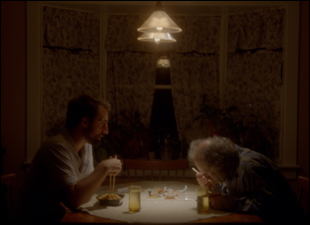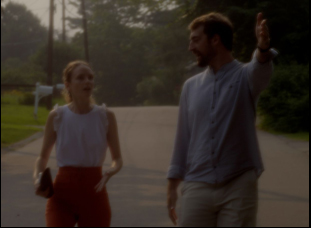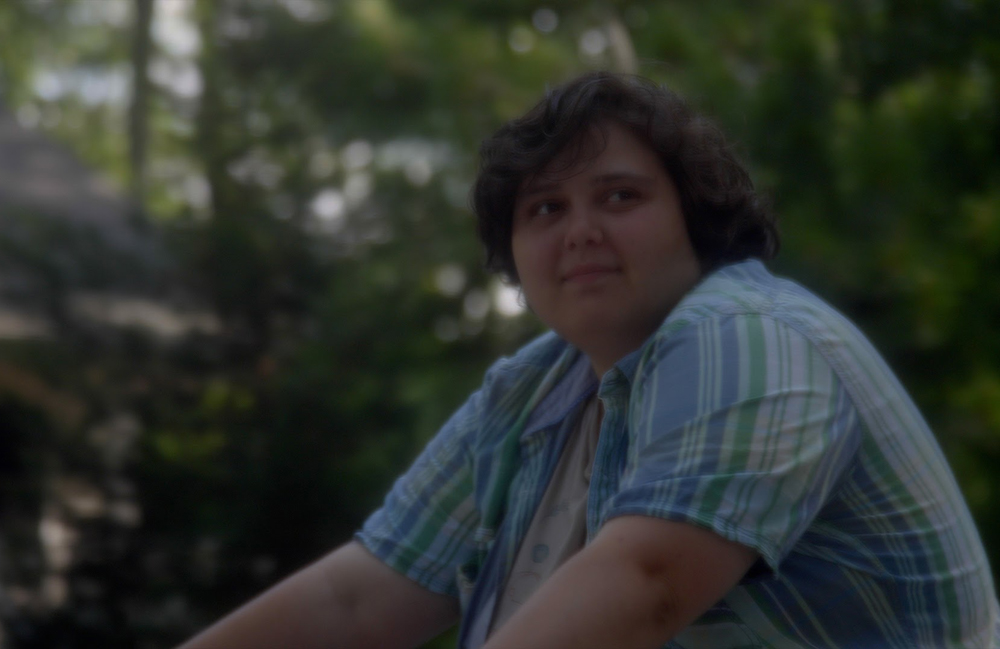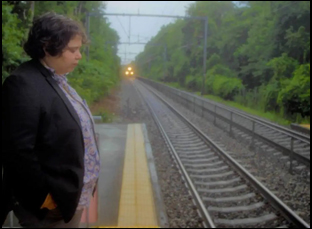Residents from the small Massachusetts town where Joshua Pikovsky and Jordan Tewetsky grew up and ultimately returned to make their endearing feature debut “Hannah Ha Ha,” will no doubt be thrilled to see some of the old haunts on screen, though they might also have a few questions, if early previews of the film there have been any indication.
“We took a lot of liberties, but I think it does capture the essence — the sleepy, warm feeling of the town well — while completely disrespecting the actual geography of the place itself,” Pikovsky laughs.
Adds Tewetsky, about the surreal experience of screening the film locally, “It’s very distracting, almost like we’re calling them stupid because none of the places are geographically linked.”
Funnily enough, that sensation of feeling both a bit familiar and being able to see things entirely differently is what makes “Hannah Ha Ha” so special, with its title even a call back to the great Andrew Bujalski turn-of-the-century comedy “Funny Ha Ha” about an aimless twenty something wandering around for a sense of purpose in her post-collegiate years yet personalized to acknowledge its singular star Hannah Lee Thompson, who may face the same issues yet does so in a completely unexpected way. Asked by her brother Paul (Roger Mancusi) if she’s ever going to find “a job that’s actually integrated into the economy,” she isn’t without pressure to do something more substantive with her life as she’s about to turn 26, but she seems to be chugging along at an admirable clip, getting by on giving guitar lessons and odd jobs in the service sector while helping her father Avram (Avram Tewetsky) tend to his garden and provide him company at dinner in an otherwise lonely house.
Long bike rides across town give Hannah time to think that’s there’s got to be a shortcut, but Pikovsky and Tewetsky bring out the beauty in observing her get to where she needs to go on her own time, lensing “Hannah” with a gauzy, beguiling glow in which one gradually seeing through the haze can feel like a superpower. The directing duo not only acutely tap into the unnerving quality that uncertainty about the future can breed as Hannah looks at others’ progress knowing that is hardly what she would want for herself, but also show off a wonderfully sly sense of humor as she trudges through many stumbling blocks to find a sense of contentment, something that was equally present in our recent conversation where trying to pin anyone down for a straight answer was futile. After a celebrated festival run that began last year as a much-deserving Grand Jury Prize winner at Slamdance, the co-directors and the film’s star spoke about the crazy lengths they had to go to make such a delicate slice-of-life, the saving grace of having their main producer Mancusi stepping into a major role as Hannah’s well-meaning, all-business brother at the last second, and the moment when Pikovsky and Tewetsky knew they’d be making movies together.
Jordan Tewetsky: I’d been wanting to work together in this capacity with Hannah for a very long time since knowing her. She’s a wonderful musician and we made a short film with Hannah and it went really well, so we figured we could do something in a longer form that could hopefully take us further. That’s where “Hannah Ha Ha” was born.
Hannah Lee Thompson: I have worked with Jordan for over 10 years now and he’s filmed musical projects of mine. We’ve just been friends for a long time, so it was just nice to go in with that context. It was very fun as someone who doesn’t act or make films to be along for the ride, so to speak, and and I have to give Jordan and Josh a lot of credit because they just made me very comfortable. They were very forgiving with me and let me tweak the lines a little bit to make sure I was comfortable saying them, which made a big difference for me as someone who cannot act. [laughs]
Jordan Tewetsky: We disagree.
I would too. But Jordan, if you’ve known Hannah for a while, were there things like the guitar lessons you wanted to include, knowing she has a talent for it?
Jordan Tewetsky: What I was interested in — and we still haven’t even really made that — is just exploring Hannah as a musician. We made something that was more a different thing than has been on both on the minds of Josh and I just speaking about a more general generational feeling and then having Hannah sort of represent that. But I just always have a great time with Hannah, [which is] where wanting to work with her as an actress was born out of and it’s a nice excuse to spend a lot of time when we’re far apart and in very different places geographically. That’s the thing about these movies — we get to be together for a period of time when most people in life don’t get to do that in their lives with people they know and like and creating something.
It looked like you may have filmed in more than a few live environments. How did you figure this out?
Jordan Tewetsky: It was easy. We would tell Hannah to do something and she’d do it immediately with no questions. [Hannah laughs]
Joshua Pikovsky: There were never any questions.
Jordan Tewetsky: Complete trust. [laughs]
Joshua Pikovsky: There’s definitely stuff that we did out in the world and I think some of it added some stress for sure…
Jordan Tewetsky: All with good reason, though. It was all because it was written down. [laughs]
Joshua Pikovsky: Yeah, if it’s written down, it must be done. [But] there were certain things like the train scene where we needed to get it, crowds be damned, and certain things were tricky, but it gives it a kind of naturalistic, semi-documentary feel.

Hannah Lee Thompson: There’s a lot of fear, I would say. Mostly about Jordan and Josh crashing the car…
Joshua Pikovsky: We’d like to have our attorney present for the rest of this. [laughs]
Hannah Lee Thompson: Yeah, not to say how we shot it, but it may have been out of the back of a hatchback car. [laughs] And you can see on my face that I’m stressed out and worried [as the character], but I’m actually stressed out and worried about them and it comes across as acting, so it worked out in that way. There were also genuinely chances to interact, so a lot of the shots are used as montage-y type moments in the film [where] I did have the liberty of interacting with my environment, which was fun. I actually don’t know if this made it in, but there was one shot of a guy who was sitting with us in the car and the whole contraption [of a camera rig] and a lot of people had this reaction – one guy stopped his car and leaned out the window and said, “Hey, what are you guys doing here?” And I was able to stop and talk to him. Moments like that were fun, and it did and it allowed us to break up the day and be able to improvise and interact naturally with the environment as opposed to doing the same action over and over again.
Hannah, I’ve also heard you say you felt like you were given the room to grow into the role over the course of the shoot…
Hannah Lee Thompson: They kidnapped me and put me on a bicycle on the final day. [laughs]
Joshua Pikovsky: That’s a weird way of putting it, but accurate. [laughs]
Jordan Tewetsky: It was what was on the page.
Hannah Lee Thompson: It was not what was on the page! [laughs] But when we made the short, it was three days, so it was just like a burst of energy that was really fun to ride. When we made this one, we were trying to harness the same dynamic, but we were doing it over 10 days that were very long. Naturally we had moments that were spontaneous and fun. Our art designer mentioned that one day, if you throw rocks up at dusk, bats will dive down, so we have shots of that in the film and that was a moment where we all, for about 20 minutes, started screaming and hollering and hurling rocks into the air and looking at bats. That stuff is great, but definitely the tiredness and the gestalt of lasting over 10 days, I didn’t have it and I think it played out on camera really well. That’s why I give credit to Josh and Jordan because I look tired and grumpy and that’s what I was at that time. [laughs]
You two jerks put her on a bike at the end of the shoot?
Joshua Pikovsky: That’s exactly right. [laughs]
Jordan Tewetsky: We were always in cahoots, knowing that we’d get praise for it down the line, though. A lot of times when Josh and I talk philosophy, we always say the end result that matters. Not about all who get hurt along the way.
Joshua Pikovsky: That’s actually all we talk about really – when we still talk because mostly we only communicate through our assistants. But when we still speak to each other, it’s about how the ends justify the means. We haven’t talked movies in forever, Jordan.
Jordan Tewetsky: There’s no time. We just know the movies aren’t part of the end. We have a bigger means to accomplish now.

Jordan Tewetsky: Avram, we didn’t know would be in it, but he kept showing up for every scene – this is my father.
Hannah Lee Thompson: [laughs] Roger playing Paul was the biggest moment of that, right?
Jordan Tewetsky: Yeah, Roger really added so much to the movie in that we didn’t have a cast member [because they had to drop out right before filming] and he was producing…
Joshua Pikovsky: [Roger] stepped into the role and…
Jordan Tewetsky: And crushed it.
Joshua Pikovsky: The first day, like we thought it would go okay, but we weren’t really sure and the first scene he did, the first scene we shot with him, he had gotten off a train because he had to go into New York for 24 hours and just came back and immediately went into the scene where him and Avram are eating dinner. It’s kind of a sad, depressing scene that’s also funny and from the first moment, it’s like the crack-of-the-bat feeling [of a] home run.
Jordan Tewetsky: Also what he brought to that character, we had intended a much softer performance going in and I think he added a lot of dynamics to it in terms of being so funny. He has the most improv in general in the movie and being able to do what he did for the role, tapping into the parts that are emotional, especially in the bike scene that we were joking about, I just think he has a very layered performance. In some ways, he plays the most challenging character in terms of communicating so many different things [where] he has to be this annoying jerk but he’s also loving.
Joshua Pikovsky: It’s a very fine line as a character [where] he’s used a lot for comedy but at the same time, he does represent a very real person. We didn’t want it to be a caricature and especially in editing, it was very tricky because there’s a lot of incredibly funny stuff we couldn’t use because it would just make him too much of a caricature, but it was brilliant.
Jordan Tewetsky: Also he and Emily [Freire], his co-producer who we haven’t spoken about, just had so much to give to the production and really helped it be such a smooth operation. They were just warriors for the film.
What’s it like getting this out in the world?
Joshua Pikovsky: It’s very surreal.
Jordan Tewetsky: I was going to say it’s a nice feeling. Is it that too, Josh?
Joshua Pikovsky: Yes. Both. That’s why. I think when we finished it we were very happy with it, but I think we had no expectations of any success whatsoever. We were happy with the work we’d done, but everything has been very nice and very gratifying, but also very strange and surreal. It’s hard to articulate.
Hannah Lee Thompson: Very much the same, like happy to be here vibes. [laughs] You know every time we get another win [from a festival] and there’s been a couple now, which is amazing, it’s still surprising, it’s crazy. What makes me really happy especially for Jordan and Josh is that the comments and the discourse online is about the things that we were talking about while making the film. That feels like a big win too – that people are asking themselves the same questions that the film is asking, which is such a success from a writing and directing standpoint, to be able to translate the message that clearly.
I should’ve asked this at the start, but how did you guys know you’d be filmmaking partners in the first place?
Jordan Tewetsky: It was love at first sight.
Joshua Pikovsky: Perfect answer.
Jordan Tewetsky: Josh saw me in sixth grade.
Joshua Pikovsky: I said, “I love this guy. Many years from now, we’re going to make a movie together. I love this guy in his Dream Theater T-shirt.” [laughs]
“Hannah Ha Ha” opens on February 10th in Los Angeles at the AMC Americana at the Brand and New York at the AMC Empire 25 with filmmaker Q & As on February 10th and 11th, and on February 13th at the Alamo Drafthouse New York with a filmmaker Q & A on February 14th and Los Angeles at the Alamo Drafthouse Downtown. It will start streaming on Fandor beginning March 21st.





